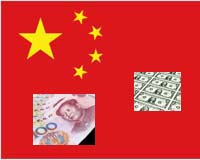| . |  |
. |
Singapore (AFP) June 20, 2010 After decades building its reputation as the go-to country for electronics manufacturers, China's intention to promote its own brands and produce the world's next Sony or Samsung was obvious during a massive telecoms exhibition in Singapore. While foreign giants such as Apple, Dell and Nokia have taken advantage of China's vast pool of cheap labour to manufacture or assemble their products, the country's own electronics firms are now looking to make their presence felt in the global marketplace. Chinese firms led by heavyweights Huawei Technologies and ZTE Corporation flew the Asian giant's flag proudly at the massive annual CommunicAsia and BroadcastAsia trade fairs in Singapore, signalling the rise of a new power in the industry. They were the top foreign exhibitors with 257 booths displaying everything from sleek tablet computers to slim mobile phones with Chinese branding, proof that the country is not just a cheap production centre for Western firms. Once dominated by European and North American brands, the global telecoms industry is now more fragmented, and Chinese companies have joined the Japanese and South Koreans on the front lines of the battle for Asian and global market share. Finland's Nokia is still the world's biggest mobile phone manufacturer, followed by Samsung and LG Electronics, the twin giants of South Korea's high-tech industry. One of the most popular Chinese brands is Huawei Technologies, which had a massive booth at CommunicAsia displaying its mobile phones and tablets. And beyond consumer devices, Chinese firms are also supplying digital encoders and receivers to the telecoms industry. Technology consultancy IDC said the global telecom industry is now worth 1.5 trillion dollars a year, with the mobile sector accounting for than half of the total. "More and more Chinese companies are paying more attention to the exhibitions overseas," said Tina Feng, who is in charge of international sales with Chengdu Dexin Digital Technology, a wireless equipment maker. "You know, China has developed very fast so they can supply high-quality stuff now, and they want to show it through their products," she told AFP, beaming with obvious national pride. She said her company, just a visitor to the show in 2008, decided to exhibit for the first time this year after spotting plenty of opportunities to reach out to new markets. "There are many customers from Asia so our company hope to enlarge this market," Feng said. "It's been rather busy for us at the show. We should be back next year again," she smiled. Chinese participation at this year's show, which ended Friday, jumped 21 percent from 2009 and the interest is not only coming from the major players, according to organiser Singapore Exhibition Services (SES). "It is not just the Huawei or the ZTE that you are talking about but you see a lot more group participation, and you also see a lot more of the medium-sized enterprises taking part," said Victor Wong, SES project director for communications events. They were also the largest foreign exhibitor last year, but only by a small margin, said Wong. Prior to that, the United States had the biggest number of foreign booths in 2008, but American firms were a distant second at this year's show with 179 exhibitors. "I think one of the reasons for them to come out is they want to export, they find that it is really worthwhile for them to do so because if you continue to do stay in China, you can only compete on price," he said. "I think we have confidence that the Chinese participation will continue to grow," Wong added. Alan Yin, a regional sales director with Chinese electronics company Konka Group, is convinced his country has what it takes to produce the world's next Samsung, Sony or Motorola. "In the past years, we have learnt technology from the Western countries but now a lot of Chinese companies have invested a lot in research and development in the high-tech area. "I am sure in the next 10 or 20 years later, Chinese companies will be stronger," Yin said.
Share This Article With Planet Earth
Related Links Global Trade News
 US welcomes China currency move, but doubts persist
US welcomes China currency move, but doubts persistWashington (AFP) June 19, 2010 US President Barack Obama welcomed China's decision Saturday to make its yuan exchange rate more flexible, saying it would boost global economic recovery from a battering financial crisis. "China's decision to increase the flexibility of its exchange rate is a constructive step that can help safeguard the recovery and contribute to a more balanced global economy," Obama said in a statement. ... read more |
|
| The content herein, unless otherwise known to be public domain, are Copyright 1995-2010 - SpaceDaily. AFP and UPI Wire Stories are copyright Agence France-Presse and United Press International. ESA Portal Reports are copyright European Space Agency. All NASA sourced material is public domain. Additional copyrights may apply in whole or part to other bona fide parties. Advertising does not imply endorsement,agreement or approval of any opinions, statements or information provided by SpaceDaily on any Web page published or hosted by SpaceDaily. Privacy Statement |